深圳小学英语四年级下册知识点复习
沪教牛津版(深圳用)四年级英语下册Unit 3 Look and see 看和看见 知识梳理
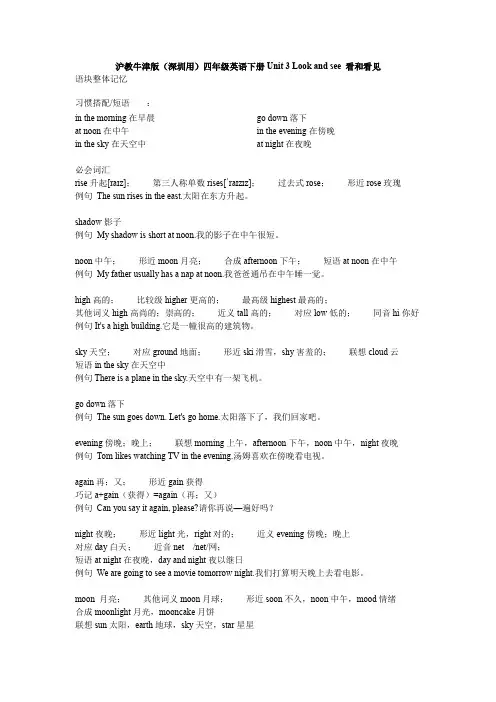
沪教牛津版(深圳用)四年级英语下册Unit 3 Look and see 看和看见语块整体记忆习惯搭配/短语:in the morning在早晨at noon在中午in the sky在天空中go down落下in the evening在傍晚at night在夜晚必会词汇rise升起[raɪz];第三人称单数rises[ˈraɪzɪz];过去式rose;形近rose玫瑰例句The sun rises in the east.太阳在东方升起。
shadow影子例句My shadow is short at noon.我的影子在中午很短。
noon中午;形近moon月亮;合成afternoon下午;短语at noon在中午例句My father usually has a nap at noon.我爸爸通吊在中午睡一觉。
high高的;比较级higher更高的;最高级highest最高的;其他词义high高尚的;崇高的;近义tall高的;对应low低的;同音hi你好例句It's a high building.它是一幢很高的建筑物。
sky天空;对应ground地面;形近ski滑雪,shy害羞的;联想cloud云短语in the sky在天空中例句There is a plane in the sky.天空中有一架飞机。
go down落下例句The sun goes down. Let's go home.太阳落下了,我们回家吧。
evening傍晚;晚上;联想morning上午,afternoon下午,noon中午,night夜晚例句Tom likes watching TV in the evening.汤姆喜欢在傍晚看电视。
again再;又;形近gain获得巧记a+gain(获得)=again(再;又)例句Can you say it again, please?请你再说—遍好吗?night夜晚;形近light光,right对的;近义evening傍晚;晚上对应day白天;近音net /net/网;短语at night在夜晚,day and night夜以继日例句We are going to see a movie tomorrow night.我们打算明天晚上去看电影。
小学英语四年级下册课本知识点(外研版三年级起点)
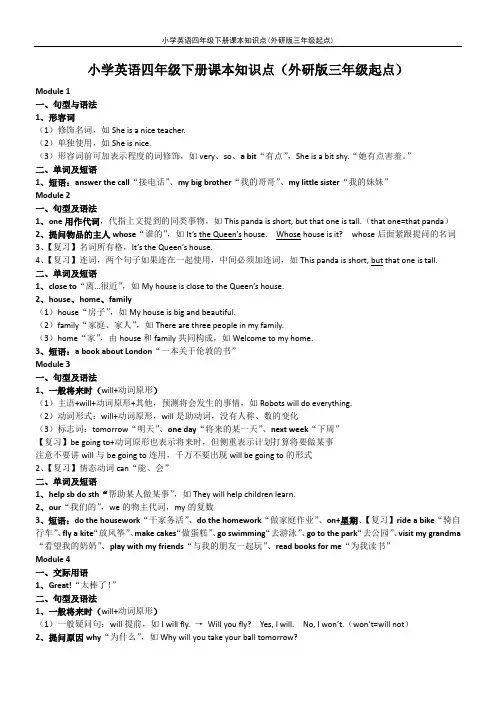
小学英语四年级下册课本知识点(外研版三年级起点)Module 1一、句型与语法1、形容词(1)修饰名词,如She is a nice teacher.(2)单独使用,如She is nice.(3)形容词前可加表示程度的词修饰,如very、so、a bit“有点”,She is a bit shy.“她有点害羞。
”二、单词及短语1、短语:answer the call“接电话”、my big brother“我的哥哥”、my little sister“我的妹妹”Module 2一、句型及语法1、one用作代词,代指上文提到的同类事物,如This panda is short, but that one is tall.(that one=that panda)2、提问物品的主人whose“谁的”,如It’s the Queen’s house. Whose house is it? whose后面紧跟提问的名词3、【复习】名词所有格,It’s the Queen’s house.4、【复习】连词,两个句子如果连在一起使用,中间必须加连词,如This panda is short, but that one is tall.二、单词及短语1、close to“离…很近”,如My house is close to the Queen’s house.2、house、home、family(1)house“房子”,如My house is big and beautiful.(2)family“家庭、家人”,如There are three people in my family.(3)home“家”,由house和family共同构成,如Welcome to my home.3、短语:a book about London“一本关于伦敦的书”Module 3一、句型及语法1、一般将来时(will+动词原形)(1)主语+will+动词原形+其他,预测将会发生的事情,如Robots will do everything.(2)动词形式:will+动词原形,will是助动词,没有人称、数的变化(3)标志词:tomorrow“明天”、one day“将来的某一天”、next week“下周”【复习】be going to+动词原形也表示将来时,但侧重表示计划打算将要做某事注意不要讲will与be going to连用,千万不要出现will be going to的形式2、【复习】情态动词can“能、会”二、单词及短语1、help sb do sth“帮助某人做某事”,如They will help children learn.2、our“我们的”,we的物主代词,my的复数3、短语:do the housework“干家务活”、do the homework“做家庭作业”、on+星期、【复习】ride a bike“骑自行车”、fly a kite“放风筝”、make cakes“做蛋糕”、go swimming“去游泳”、go to the park“去公园”、visit my grandma “看望我的奶奶”、play with my friends“与我的朋友一起玩”、read books for me“为我读书”Module 4一、交际用语1、Great!“太棒了!”二、句型及语法1、一般将来时(will+动词原形)(1)一般疑问句:will提前,如I will fly. →Will you fly? Yes, I will. No, I won’t.(won’t=will not)2、提问原因why“为什么”,如Why will you take your ball tomorrow?(1)回答:Because we are going to have a picnic tomorrow.(2)Why not?“为什么不呢”,Why won’t you do sth?=Why not do sth?eg:Why won’t you take your ball tomorrow? = Why not take your ball tomorrow?3、连词because“因为”、so“所以”,注意英语中because和so不能连用eg:Because we are going to have a picnic tomorrow, I will take my kite.We are going to have a picnic tomorrow, so I will take my kite.【复习】so“如此、这么”,如It is so hot today.4、询问天气What will be the weather?“天气怎么样?”,回答It will be+形容词,如It will be sunny.注意:will后要求加动词原形,am/is/are的原形是be,如It is sunny today. →It will be sunny tomorrow.三、单词及短语1、take“带着、拿着”,如take your kite“带着你的风筝”【复习】take“拍摄”,如take pictures“拍照”2、名词变形容词:sun-sunny、cloud-cloudy、wind-windy3、短语:have a picnic“去野餐”、【复习】in+地点,如in HaikouModule 5一、句型及语法1be动词)(1)主语+be动词过去式+其他,表示过去的情况,如I was two then.“我那时两岁”←I am ten now.“我现在十岁。
四年级英语下册重点知识点总结
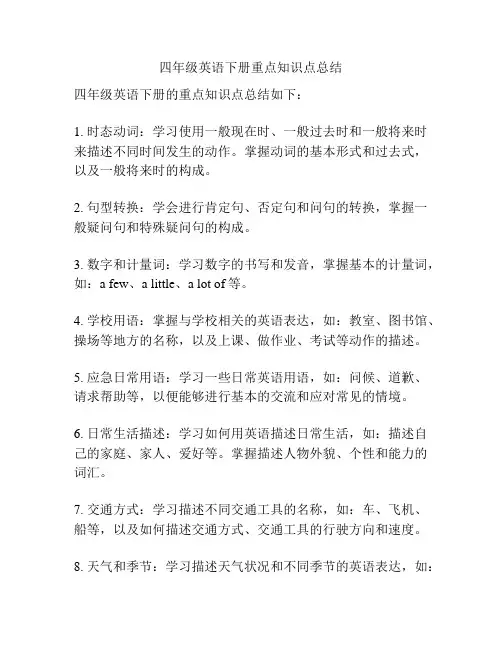
四年级英语下册重点知识点总结
四年级英语下册的重点知识点总结如下:
1. 时态动词:学习使用一般现在时、一般过去时和一般将来时来描述不同时间发生的动作。
掌握动词的基本形式和过去式,以及一般将来时的构成。
2. 句型转换:学会进行肯定句、否定句和问句的转换,掌握一般疑问句和特殊疑问句的构成。
3. 数字和计量词:学习数字的书写和发音,掌握基本的计量词,如:a few、a little、a lot of等。
4. 学校用语:掌握与学校相关的英语表达,如:教室、图书馆、操场等地方的名称,以及上课、做作业、考试等动作的描述。
5. 应急日常用语:学习一些日常英语用语,如:问候、道歉、请求帮助等,以便能够进行基本的交流和应对常见的情境。
6. 日常生活描述:学习如何用英语描述日常生活,如:描述自己的家庭、家人、爱好等。
掌握描述人物外貌、个性和能力的词汇。
7. 交通方式:学习描述不同交通工具的名称,如:车、飞机、船等,以及如何描述交通方式、交通工具的行驶方向和速度。
8. 天气和季节:学习描述天气状况和不同季节的英语表达,如:
晴天、阴天、下雨、夏天、秋天等。
9. 礼貌用语:学习基本的礼貌用语,如:谢谢、对不起、请等,以便能够与他人进行礼貌的交流。
以上是四年级英语下册的重点知识点总结,希望对你有帮助!。
2024年小学四年级英语下册知识点资料
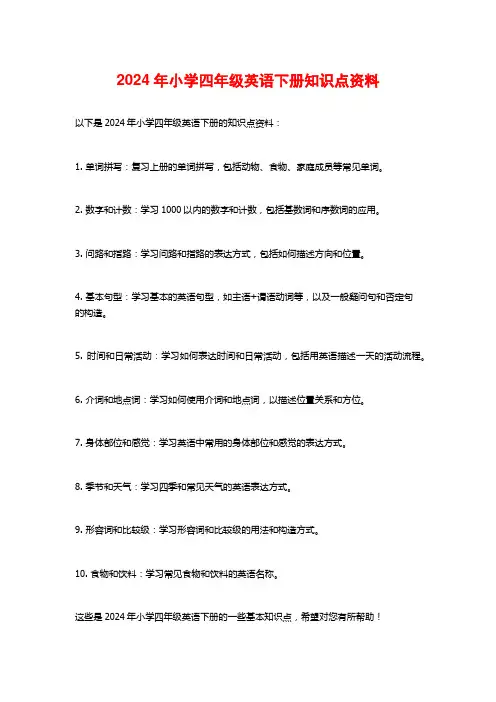
2024年小学四年级英语下册知识点资料
以下是2024年小学四年级英语下册的知识点资料:
1. 单词拼写:复习上册的单词拼写,包括动物、食物、家庭成员等常见单词。
2. 数字和计数:学习1000以内的数字和计数,包括基数词和序数词的应用。
3. 问路和指路:学习问路和指路的表达方式,包括如何描述方向和位置。
4. 基本句型:学习基本的英语句型,如主语+谓语动词等,以及一般疑问句和否定句
的构造。
5. 时间和日常活动:学习如何表达时间和日常活动,包括用英语描述一天的活动流程。
6. 介词和地点词:学习如何使用介词和地点词,以描述位置关系和方位。
7. 身体部位和感觉:学习英语中常用的身体部位和感觉的表达方式。
8. 季节和天气:学习四季和常见天气的英语表达方式。
9. 形容词和比较级:学习形容词和比较级的用法和构造方式。
10. 食物和饮料:学习常见食物和饮料的英语名称。
这些是2024年小学四年级英语下册的一些基本知识点,希望对您有所帮助!。
深圳小学英语四年级下册知识点复习
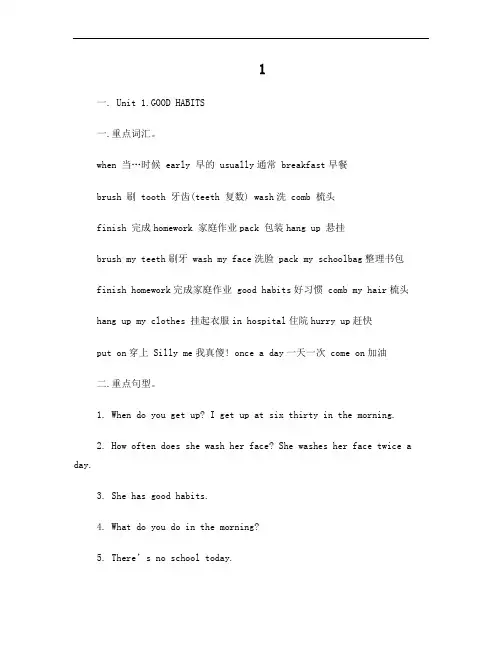
1一. Unit 1.GOOD HABITS一.重点词汇。
when 当…时候 early 早的 usually通常 breakfast早餐brush 刷 tooth 牙齿(teeth 复数) wash洗 comb 梳头finish 完成homework 家庭作业pack 包装hang up 悬挂brush my teeth刷牙 wash my face洗脸 pack my schoolbag整理书包finish homework完成家庭作业 good habits好习惯 comb my hair梳头hang up my clothes 挂起衣服in hospital住院hurry up赶快put on穿上 Silly me我真傻! once a day一天一次 come on加油二.重点句型。
1. When do you get up? I get up at six thirty in the morning.2. How often does she wash her face? She washes her face twice a day.3. She has good habits.4. What do you do in the morning?5. There’s no school today.三.重点语法。
1. It’s time for sth.(n);It’s time to do sth 例如:It’s time for school./It’s time to go to school. 到上学的时间了。
2. do 和does 的用法does 用于第三人称单数(she,he,it ,Tom等)do 用于第一人称,第二人称,第三人称复数(I,you,we,they,等)3. when 引导的特殊疑问句。
When do you(第二人称,第三人称复数,) +(动词原形)…?你什么时候做…?When does he/she(第三人称单数) + (动词原形)…?他/她什么时候做…?例句:When do you get up ?你什么时候起床?When does she/he get up ?他/她什么时候起床?4. 用 How often 来对频率提问:How often do you + (动词原形)…?How oftendoes+(第三人称单数)+动词原形…?表示频率的次数来回答。
深圳小学英语4下知识点总结及练习unit11
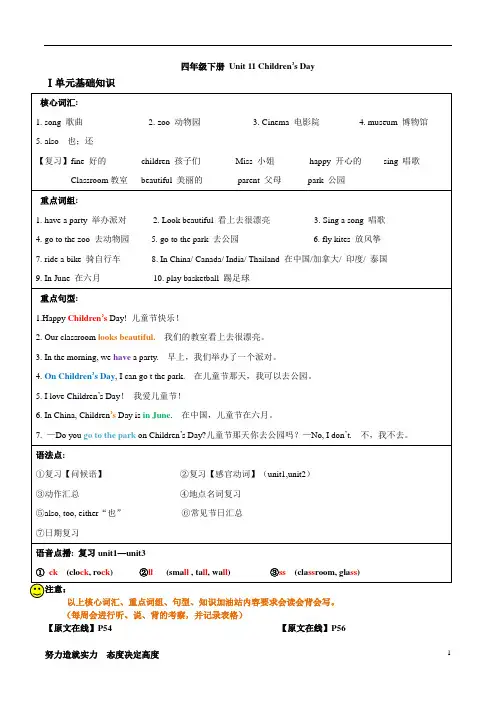
四年级下册Unit 11 Children’s Day Ⅰ单元基础知识➢➢➢1.2.3.4.5.6.7.➢➢(每周会进行听、说、背的考察,并记录表格)【原文在线】P54 【原文在线】P56Ⅱ 知识详解[词汇全解]1. 【情景交际】【汇总】【小试牛刀】( )1. 你的好朋友Ann 今天过生日,你应该对她说:My garden①It is Children ’s Day. “Hello, Jill.”“Hello, Alice.” “How are you?”“Fine, thanks.” ②Our classroom looks beautiful. “Good morning, Miss Fang.” “Good morning, Happy Children ’s Day!”③ In the morning, we have a party.“Alice and Jill, let ’s sing a song.”④In the afternoon, I go to the zoo with my parents. I love Child ren’s Day!①In China, Children ’s Day is June.②In Canada, Childre n’s Day is in November.③ In India, Children ’s Day is also in November.④In Thailand, Children ’s Day is in January.June 1 November 20 November 14 January一、日常问候和答语 1. Hello/ Hi 你好。
3. Good morning/ afternoon/evening. 早上/下午/晚上好。
4. How are you(this morning/afternoon/evening)? 你今天早晨/下午/晚上好吗?5. Fine, thank you/ thanks. 我很好,谢谢。
深圳小学英语4下知识点总结及练习unit10
四年级下册Unit 10 My garden Ⅰ单元基础知识➢➢➢1.➢➢(每周会进行听、说、背的考察,并记录表格)【原文在线】P50 【原文在线】P52【小试牛刀】(根据My garden 回答下面问题) 1.What does the plants have?__________________________________ 2. What colour are the flowers?__________________________________ 3. What do I like doing in the garden?__________________________________Ⅱ 知识详解[词汇全解]1. Look at 看... 原文链接:Look at us!. 看我们! 【拓展】①.See, watch, look, read 的区别① See “看见,看到”,强调看的结果 see a film 看电影 see the doctor 看医生(看病) ② Look 强调看的动作 look at this picture 看这张图片③ Watch “观看”,强调看活动,非静止画面 Watch TV 看电视 Watch a match 看比赛 ④ Read “阅读”,与文字有关的东西 read book/ magazine/ newspaper 读书/杂志/报纸②.look 的固定搭配look at 看 look after 照顾 look for 寻找 have a look 看一看【牛刀小试】 填入see 、look 、watch 、read 使句子完整。
①.I would like to ___ newspapers(报纸) when I am free. ②.He stands at the window and __ a policeman. ③.____!The bus is coming.My garden① I have a garden. There are many plants in my garden. They have small green leaves. I water them every day. The plants grow and grow. ② Now my plants are tall and big. They have flowers. Some are red. Some are yellow. They are all beautiful. I like reading and listening to music in my garden. Two seeds① We are seeds. We are small and brown.② It rains. We are thirsty. We drink the rain water.③ It is sunny and warm. We like the sun.④ Look at us! There are two small leaves on our heads.⑤ We grow and grow. We have big leaves.⑥ Now we have yellow flowers.④.The little boy likes ____TV very much.⑤.He will go to ___a volleyball match.⑥.How many birds can you ___ in the tree?⑦.Does Lily often go to ___ a film(电影) on Sunday?2.【复习】人称代词【原文链接】I water them every day. 我每天给他们浇水。
四年级下册英语笔记
四年级下册英语笔记一、重点单词1. family 家庭2. friend 朋友3. school 学校4. library 图书馆5. post office 邮局6. hospital 医院7. police station 警察局8. science museum 科学博物馆9. cinema 电影院10. train station 火车站二、重点短语1. meet at the school gate 在校门口集合2. take the train 乘火车3. get to the train station 到达火车站4. on the way to the library 在去图书馆的路上5. post a letter 寄信6. buy some books 买书7. go to the cinema 看电影8. see a film 看电影9. go to the hospital 去医院10. be ill 生病三、重点句型1. Where do you live? 你住在哪里?I live in + 地点。
我住在+地点。
2. How do you get to + 地点?你怎么到达+地点?I get to + 地点 + by + 交通方式。
我通过+交通方式+到达+地点。
3. What do you do at the weekend?你周末做什么?I often + 动词。
我经常+动词。
偶尔会+动词。
有时+动词。
4. What are you going to do this weekend?你这个周末打算做什么?I’m going to + 动词。
我打算+动词。
深圳小学课本四年级下册第4单元知识点
课本复习纲要班级:班教师:日期:深圳小学课本四年级下册第4单元New Words(必须掌握的词汇,要求扎实掌握发音和拼写)take medicine(吃药), have a fever(发烧), have a cold(感冒), have a rest(休息一会儿), have a headache(头痛), have a stomachache(胃痛), have a backache(背痛), have a toothache(牙疼), advice(建议), toothbrush(牙刷), bite(咬), biting(锋利的), surface(表面), inside(在……里面), outside(在……外面), chocolate(巧克力), tick(给……打勾), push(推), pull(拉,拔), loose(松的), tight(紧的), role-play(角色扮演), healthy(健康的), patient(病人), grid (网格), in a row(连续地), fill(填写), blank(空白处), degree centigrade(摄氏度).New Sentences(必须掌握的句子,要求扎实掌握发音和拼写)1、What’s wrong with you? 你怎么了?2、I don’t feel very well. 我感觉不舒服。
Phonetics(音标)在“push”、“pull”、“full”和“put”当中,你能找到什么发音规律?Attention(注意)【注意1】“What’s wrong with you?”等于“What’s the matter with you?”。
【注意2】表示身体方面的“好”,通常用“well”而不用“good”。
【注意3】℃的意思是“摄氏度”,全称是“degree centigrade”。
其中“degree”表示“程度”,“centi”表示“100”,“grade”表示“级别”。
沪教牛津版(深圳用)四年级英语下册Unit 1 Touch and feel 触摸和感觉 知识梳理
沪教牛津版(深圳用)四年级英语下册Unit 1 Touch and feel 触摸和感觉语块整体记忆习惯搭配/短语:a toy dog/bear一个玩具狗/熊an apple一个苹果惯用语:Well done!做得好!必会词汇feel摸起来;感到;过去式felt;第三人称单数feels;形近feed喂养近音fill 装满;转化feel n.触觉;派生feeling n.感受soft柔软的;对应hard坚硬的;例句Silk feels soft.丝绸摸起来很柔软。
touch碰;触摸;第三人称单数touches;形近teach教;转化touch n.触觉例句Don't touch it!不要触摸它!hard坚硬的;其他词义hard艰难的;形近harm伤害,yard院子;对应soft柔软的例句The stone is hard.这块石头很坚硬。
thick厚的;粗的;比较级thicker更厚的;更粗的;最高级thickest最厚的;最粗的其他词义thick浓密的;形近think思考,chick小鸡;对应thin薄的;细的例句That book is very thick.那本书很厚。
thin薄的;细的;比较级thinner更薄的;更细的;最高级thinnest最薄的;最细的其他词义thin瘦的;形近then然后;对应thick厚的;粗的近音thing物,东西例句Cut the vegetables into thin strips.把蔬菜切成细条。
blind瞎的;失明的;形近blink眨眼睛;派生blindly adv.盲目地;摸黑地转化blind v.使失明;联想deaf耳聋的;例句There is a blind man over there.那边有一个盲人。
noise响声;吵闹声;形近nose鼻子;派生noisy adj.吵闹的;联想sound声音例句Don't make a noise.别出声。
- 1、下载文档前请自行甄别文档内容的完整性,平台不提供额外的编辑、内容补充、找答案等附加服务。
- 2、"仅部分预览"的文档,不可在线预览部分如存在完整性等问题,可反馈申请退款(可完整预览的文档不适用该条件!)。
- 3、如文档侵犯您的权益,请联系客服反馈,我们会尽快为您处理(人工客服工作时间:9:00-18:30)。
一. Unit 1.GOOD HABITS一.重点词汇。
when 当…时候 early 早的 usually通常 breakfast早餐brush 刷 tooth 牙齿(teeth 复数) wash洗 comb 梳头finish 完成homework 家庭作业pack 包装hang up 悬挂brush my teeth刷牙 wash my face洗脸 pack my schoolbag整理书包finish homework完成家庭作业 good habits好习惯 comb my hair梳头hang up my clothes 挂起衣服in hospital住院hurry up赶快put on穿上 Silly me我真傻! once a day一天一次 come on加油二.重点句型。
1. When do you get up? I get up at six thirty in the morning.2. How often does she wash her face? She washes her face twice a day.3. She has good habits.4. What do you do in the morning?5. There’s no school today.三.重点语法。
1. It’s time for sth.(n);It’s time to do sth 例如:It’s time for school./It’s time to go to school. 到上学的时间了。
2. do 和does 的用法does 用于第三人称单数(she,he,it ,Tom等)do 用于第一人称,第二人称,第三人称复数(I,you,we,they,等)3. when 引导的特殊疑问句。
When do you(第二人称,第三人称复数,) +(动词原形)…?你什么时候做…?When does he/she(第三人称单数) + (动词原形)…?他/她什么时候做…?例句:When do you get up ?你什么时候起床?When does she/he get up ?他/她什么时候起床?4. 用 How often 来对频率提问:How often do you + (动词原形)…?How oftendoes+(第三人称单数)+动词原形…?表示频率的次数来回答。
(once,twice,three times,four times---)例句:How often do you wash your face ?你多久洗一次脸?I wash my face twice a day. 我一天洗两次脸。
How often does Sam wash his face ?Sam多久洗一次脸?He washes his face twice a day. 他一天洗两次脸。
5. 句型:First ,Next, Then , After that …先后顺序表达。
例如:First ,I get up early. Next, I brush my teeth .Then,I comb my hair . After that ,I eat breakfast .UNIT 2 MANNERS一.重点词汇。
manner 礼仪 quiet 安静的 library 图书馆 corridor 走廊polite 礼貌的 rude 粗鲁的 noisy 吵闹的 rubbish bin 垃圾箱floor 地板 go away出去 should 应该 Model student模范生run/walk in the corridors在走廊上跑/走 throw rubbish one the floor把垃圾扔在地上 well done干得好throw rubbish in the bin 把垃圾扔进垃圾桶 school rules校规二.重点句型。
1. Pease don't throw rubbish on the floor!2. You shouldn’t be rude. You shoud be polite.3. Do you want to be a model student?4. Who’s a model student this year?5. She’s polite and helpful, too.三.重点语法。
1. 祈使句:提出请求,建议或发出命令的句子。
如:Throw rubbish in the bin, please . 请把垃圾扔到垃圾篓。
Don’t run in the corridors. 不要再走廊里跑.Be polite. 有礼貌! Be queit. 保持安静。
Don’t be rude. 不要无礼。
Don’t be noisy. 不要吵闹。
2.should 应该,应当,否定形式shouldn’t.should, may, must, can, need例如:He should be polite. 他应该有礼貌。
She shouldn’t run in the classroom.她不应该在教室里跑。
UNIT3 SEASONS一.重点词汇。
season 季节 website 网站 weather天气 different 不同的 spring 春天summer 夏天 autumn 秋天 winter 冬天 place 地方 warm 温暖的cool 凉爽的 because因为 rain 下雨 snow 下雪 ride a bike骑自行cool and dry凉爽干燥 make a snowman堆雪人 a fun holiday有趣的假日read a poster 阅读海报 go for a swim去游泳 the ugly duck丑小鸭fly away 飞走了 mother duck母鸭 fly a kite放风筝二.语法重点。
1.介词in后接时间的用法早、午、晚要用ineg. in the morning/afternoon/evening在早上/下午/晚上in the day在白天b. 年、月、年月、季节、第几周前用ineg. in Spring/in summer/in autumn/in winter在春天/夏天/秋天/冬天 in April在四月 in 1987在1987年 in April 1987在1987年4月 in the first week of this month这个月的第一个星期2.be from=come from来自---Where are you from? I am from …Where is she/ he from? She/He is from …Where do you come from? I come from …Where does she/he come from? She/He comes from …3. 问某地天气:What’s the weather like in+(地方)in+(季节)?eg. What’s the weather like in Harbin in winter? It often snows4.Why 是问原因的特殊疑问句,回答时用Because 引导句子。
UNIT 4一.重点词汇。
sick 生病 toothbrush牙刷 chocolate巧克力 surface表面take some medicine 吃药 go to hospital 去医院(专指去看病)go to a clinic 去诊所 have a fever 发烧 have a cold 感冒have a rest 休息 have a headache 头痛 have a stomachache 胃痛二.重点句型。
1. What’s the matter?2. You need to go to hospital and see the doctor.3. You should also drink a lot of water and stay in bed.4. You should brush you teeth with a toothbrush like this one.5. Brush the inside/outside surface of your teeth.三.重点语法。
1.”What’s the matter+人名? 你怎么了?回答:I have a …. /We have a….例句:What’s the matter, Tim?怎么啦,Tim?I have a stomachache. 我胃痛。
同义句:What’s wrong with+人名?2.注意吃药take some medicine 而不是 eat some medicine3. go to hospital go to the hospitalUnit 4一.重点词汇。
grow种植 soil土壤 light光 large大的 guess猜 bee蜜蜂root根部remember记得do an experiment做实验tonight今晚grow quickly/slowly 快速/缓慢生长 learn about学习 Group 2第二组a small/large pot一个大的/小的花盆three tomato plants三株西红柿fall on掉落 TV show电视节目 find out发现/找到二.重点句型。
1. We want to grow some tomatoes.2. How often should we water the plant?3. It needs a small pot of soil.4. Group 1, give this plant a little water once a day.5. What will happen?7. What do plants need?三.重点语法。
1. a little和little不可数 (a few和few可数)2. a lot of=lots of(可数+不可数)a lot of light大量光 a lot of pots许多花盆3. 一般将来时一般将来时表示将来的动作或状态。
常与表示将来的时态连用如tomorrow, next week, next month, next year, in a few days等。
shall(第一人称),will(第二、三人称)+动词原形构成。
